Postcolonialism in Australia: Analyzing a Song and a News Story
VerifiedAdded on 2020/04/29
|9
|2670
|318
Essay
AI Summary
This essay delves into the multifaceted concept of postcolonialism in Australia, examining its impact through the analysis of A. B. Originals' song "January 26" and a news story from The Daily Telegraph. The essay begins by defining postcolonialism and its historical context, tracing the influence of imperialism and colonialism on native populations. It then analyzes the song "January 26," which critiques the celebration of Australia Day and highlights the historical injustices faced by indigenous Australians. The lyrics and music video are examined to uncover the expression of aboriginals' frustration and resistance. Furthermore, the essay explores a news story about a Muslim community in Lakemba, shedding light on the complexities of cultural interactions and the imposition of cultural norms. The essay discusses themes of cultural hybridity, monoculture, and the challenges faced by both indigenous Australians and immigrant communities. The essay concludes by summarizing the analysis, emphasizing the lasting effects of both historical colonialism and contemporary cultural clashes on the lives and rights of the native aboriginals. It underscores the symbolic representation of oppression by both the colonial British and extremist groups, offering insights into the ongoing struggles for cultural identity and social justice in Australia.
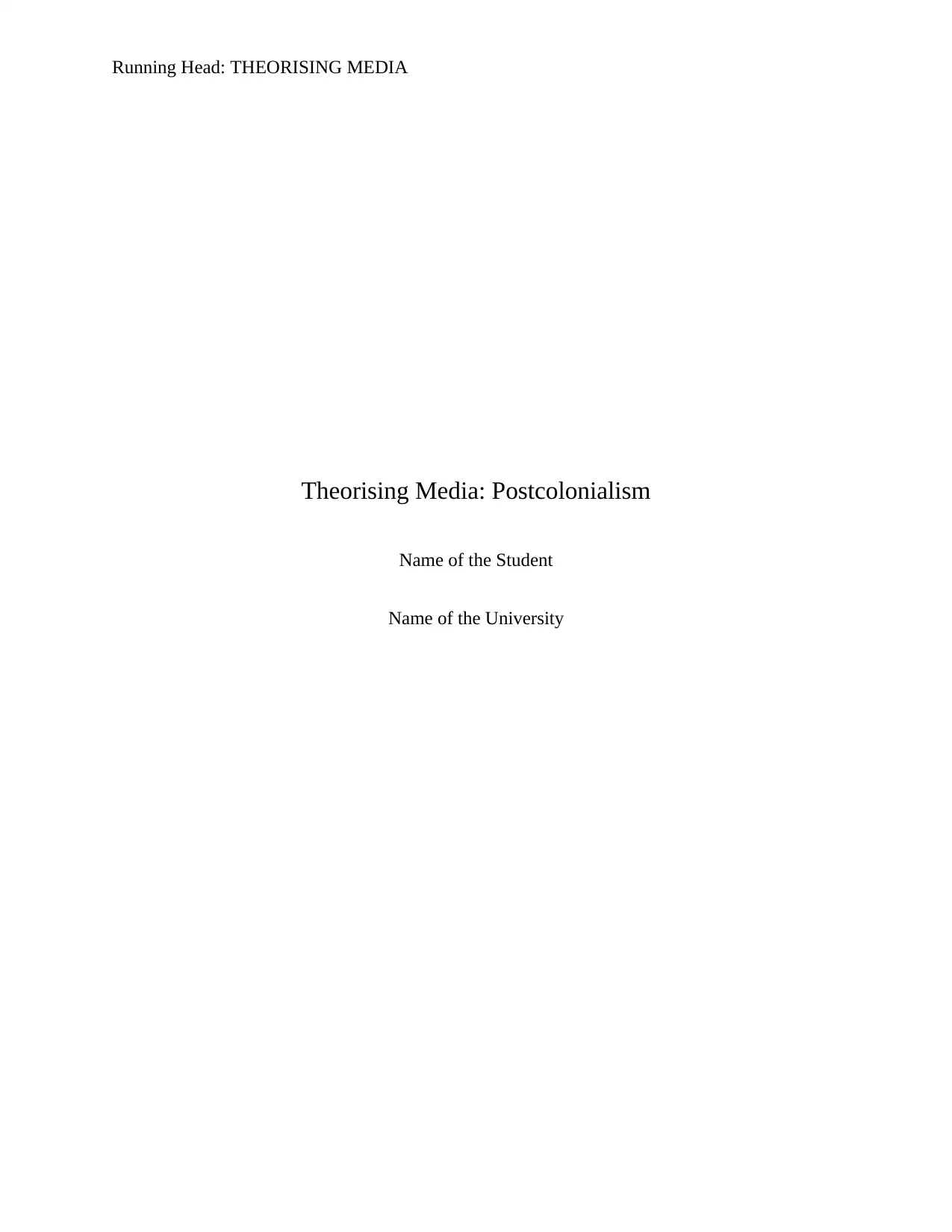
Running Head: THEORISING MEDIA
Theorising Media: Postcolonialism
Name of the Student
Name of the University
Theorising Media: Postcolonialism
Name of the Student
Name of the University
Paraphrase This Document
Need a fresh take? Get an instant paraphrase of this document with our AI Paraphraser
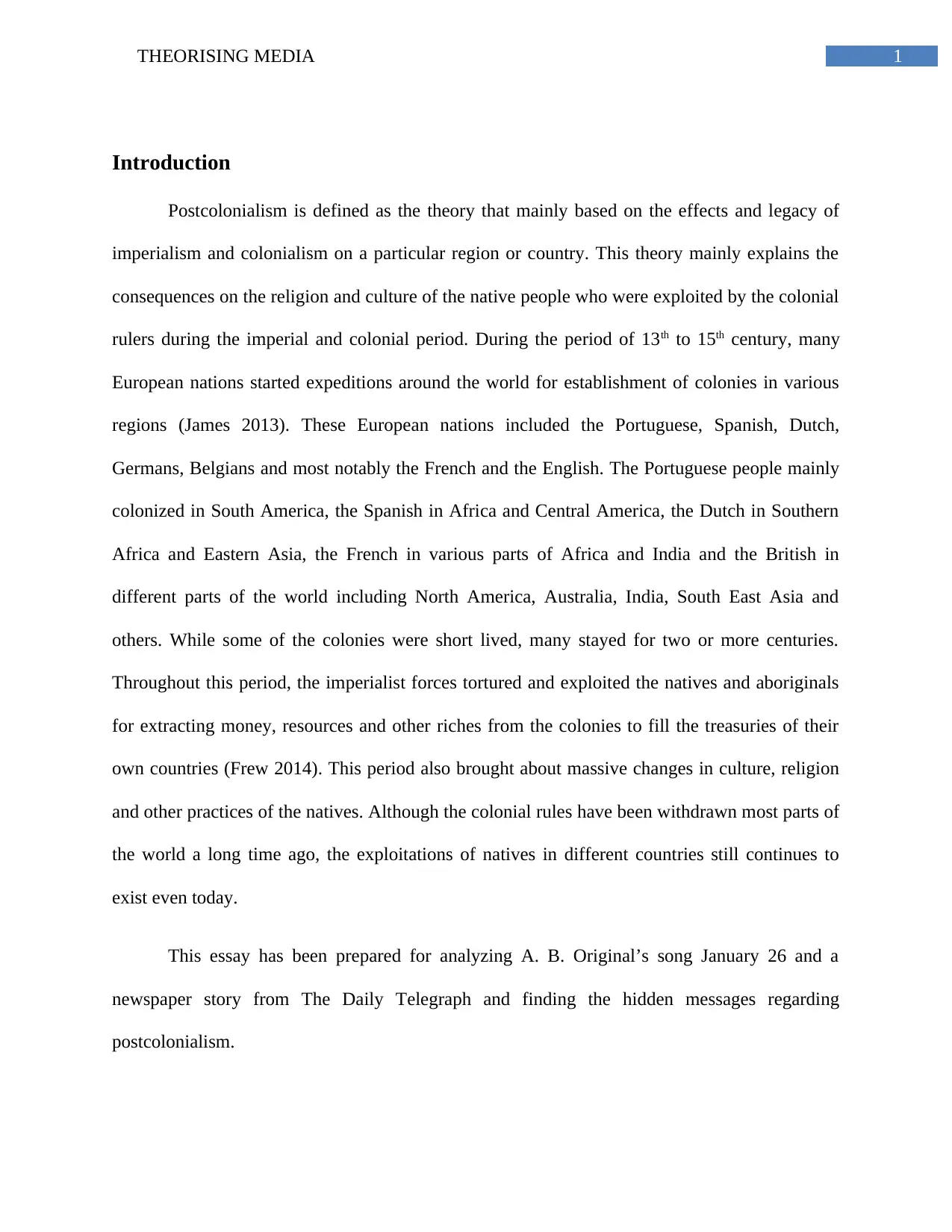
1THEORISING MEDIA
Introduction
Postcolonialism is defined as the theory that mainly based on the effects and legacy of
imperialism and colonialism on a particular region or country. This theory mainly explains the
consequences on the religion and culture of the native people who were exploited by the colonial
rulers during the imperial and colonial period. During the period of 13th to 15th century, many
European nations started expeditions around the world for establishment of colonies in various
regions (James 2013). These European nations included the Portuguese, Spanish, Dutch,
Germans, Belgians and most notably the French and the English. The Portuguese people mainly
colonized in South America, the Spanish in Africa and Central America, the Dutch in Southern
Africa and Eastern Asia, the French in various parts of Africa and India and the British in
different parts of the world including North America, Australia, India, South East Asia and
others. While some of the colonies were short lived, many stayed for two or more centuries.
Throughout this period, the imperialist forces tortured and exploited the natives and aboriginals
for extracting money, resources and other riches from the colonies to fill the treasuries of their
own countries (Frew 2014). This period also brought about massive changes in culture, religion
and other practices of the natives. Although the colonial rules have been withdrawn most parts of
the world a long time ago, the exploitations of natives in different countries still continues to
exist even today.
This essay has been prepared for analyzing A. B. Original’s song January 26 and a
newspaper story from The Daily Telegraph and finding the hidden messages regarding
postcolonialism.
Introduction
Postcolonialism is defined as the theory that mainly based on the effects and legacy of
imperialism and colonialism on a particular region or country. This theory mainly explains the
consequences on the religion and culture of the native people who were exploited by the colonial
rulers during the imperial and colonial period. During the period of 13th to 15th century, many
European nations started expeditions around the world for establishment of colonies in various
regions (James 2013). These European nations included the Portuguese, Spanish, Dutch,
Germans, Belgians and most notably the French and the English. The Portuguese people mainly
colonized in South America, the Spanish in Africa and Central America, the Dutch in Southern
Africa and Eastern Asia, the French in various parts of Africa and India and the British in
different parts of the world including North America, Australia, India, South East Asia and
others. While some of the colonies were short lived, many stayed for two or more centuries.
Throughout this period, the imperialist forces tortured and exploited the natives and aboriginals
for extracting money, resources and other riches from the colonies to fill the treasuries of their
own countries (Frew 2014). This period also brought about massive changes in culture, religion
and other practices of the natives. Although the colonial rules have been withdrawn most parts of
the world a long time ago, the exploitations of natives in different countries still continues to
exist even today.
This essay has been prepared for analyzing A. B. Original’s song January 26 and a
newspaper story from The Daily Telegraph and finding the hidden messages regarding
postcolonialism.
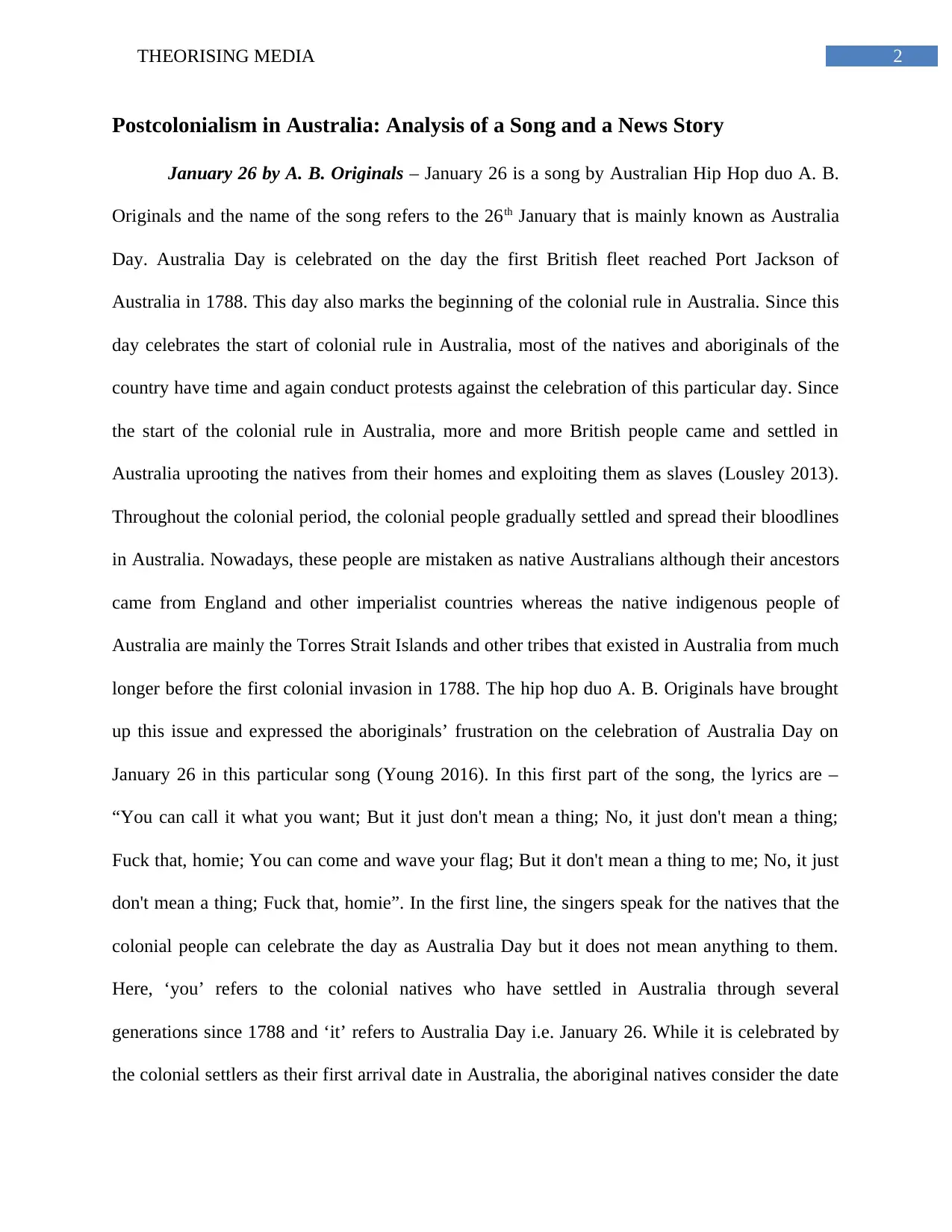
2THEORISING MEDIA
Postcolonialism in Australia: Analysis of a Song and a News Story
January 26 by A. B. Originals – January 26 is a song by Australian Hip Hop duo A. B.
Originals and the name of the song refers to the 26th January that is mainly known as Australia
Day. Australia Day is celebrated on the day the first British fleet reached Port Jackson of
Australia in 1788. This day also marks the beginning of the colonial rule in Australia. Since this
day celebrates the start of colonial rule in Australia, most of the natives and aboriginals of the
country have time and again conduct protests against the celebration of this particular day. Since
the start of the colonial rule in Australia, more and more British people came and settled in
Australia uprooting the natives from their homes and exploiting them as slaves (Lousley 2013).
Throughout the colonial period, the colonial people gradually settled and spread their bloodlines
in Australia. Nowadays, these people are mistaken as native Australians although their ancestors
came from England and other imperialist countries whereas the native indigenous people of
Australia are mainly the Torres Strait Islands and other tribes that existed in Australia from much
longer before the first colonial invasion in 1788. The hip hop duo A. B. Originals have brought
up this issue and expressed the aboriginals’ frustration on the celebration of Australia Day on
January 26 in this particular song (Young 2016). In this first part of the song, the lyrics are –
“You can call it what you want; But it just don't mean a thing; No, it just don't mean a thing;
Fuck that, homie; You can come and wave your flag; But it don't mean a thing to me; No, it just
don't mean a thing; Fuck that, homie”. In the first line, the singers speak for the natives that the
colonial people can celebrate the day as Australia Day but it does not mean anything to them.
Here, ‘you’ refers to the colonial natives who have settled in Australia through several
generations since 1788 and ‘it’ refers to Australia Day i.e. January 26. While it is celebrated by
the colonial settlers as their first arrival date in Australia, the aboriginal natives consider the date
Postcolonialism in Australia: Analysis of a Song and a News Story
January 26 by A. B. Originals – January 26 is a song by Australian Hip Hop duo A. B.
Originals and the name of the song refers to the 26th January that is mainly known as Australia
Day. Australia Day is celebrated on the day the first British fleet reached Port Jackson of
Australia in 1788. This day also marks the beginning of the colonial rule in Australia. Since this
day celebrates the start of colonial rule in Australia, most of the natives and aboriginals of the
country have time and again conduct protests against the celebration of this particular day. Since
the start of the colonial rule in Australia, more and more British people came and settled in
Australia uprooting the natives from their homes and exploiting them as slaves (Lousley 2013).
Throughout the colonial period, the colonial people gradually settled and spread their bloodlines
in Australia. Nowadays, these people are mistaken as native Australians although their ancestors
came from England and other imperialist countries whereas the native indigenous people of
Australia are mainly the Torres Strait Islands and other tribes that existed in Australia from much
longer before the first colonial invasion in 1788. The hip hop duo A. B. Originals have brought
up this issue and expressed the aboriginals’ frustration on the celebration of Australia Day on
January 26 in this particular song (Young 2016). In this first part of the song, the lyrics are –
“You can call it what you want; But it just don't mean a thing; No, it just don't mean a thing;
Fuck that, homie; You can come and wave your flag; But it don't mean a thing to me; No, it just
don't mean a thing; Fuck that, homie”. In the first line, the singers speak for the natives that the
colonial people can celebrate the day as Australia Day but it does not mean anything to them.
Here, ‘you’ refers to the colonial natives who have settled in Australia through several
generations since 1788 and ‘it’ refers to Australia Day i.e. January 26. While it is celebrated by
the colonial settlers as their first arrival date in Australia, the aboriginal natives consider the date
⊘ This is a preview!⊘
Do you want full access?
Subscribe today to unlock all pages.

Trusted by 1+ million students worldwide
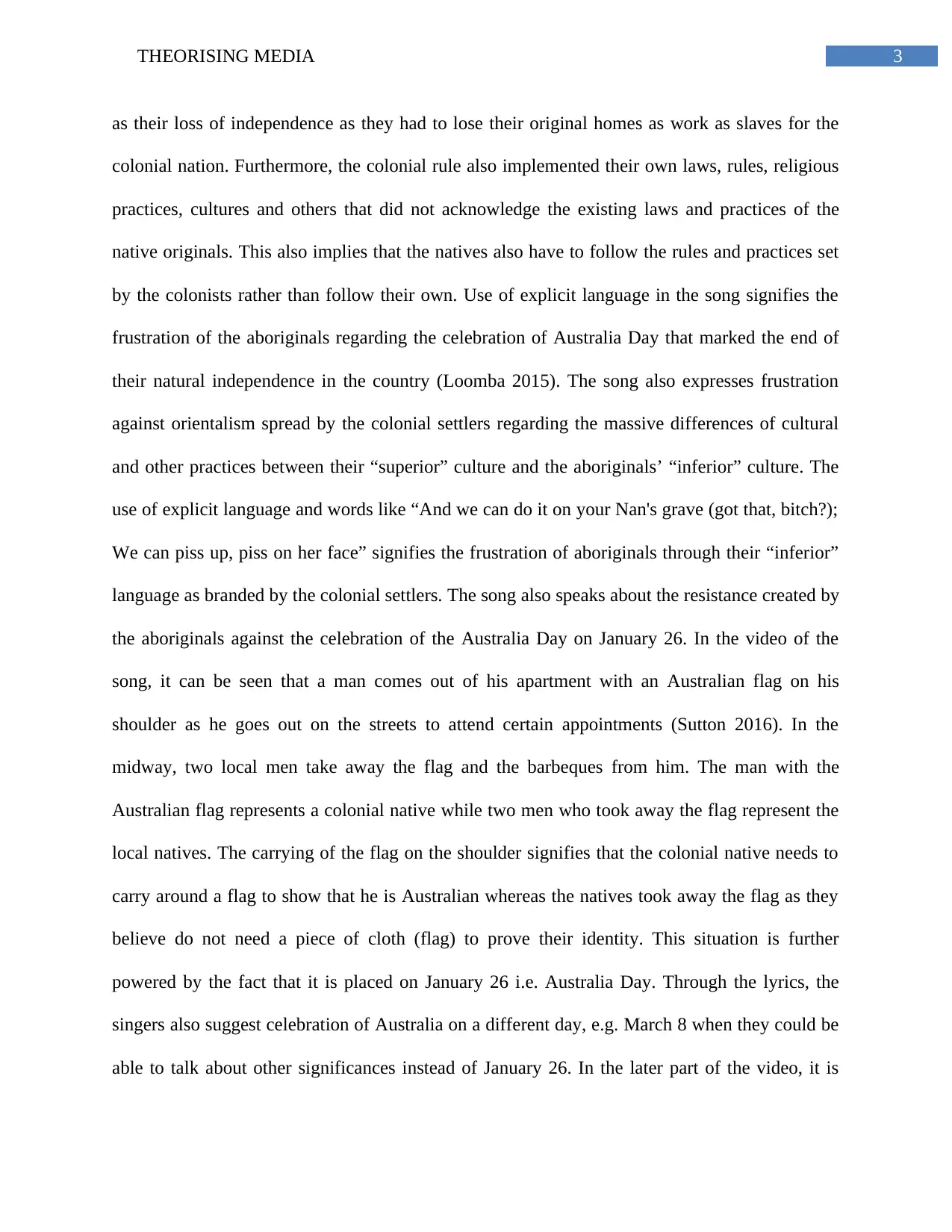
3THEORISING MEDIA
as their loss of independence as they had to lose their original homes as work as slaves for the
colonial nation. Furthermore, the colonial rule also implemented their own laws, rules, religious
practices, cultures and others that did not acknowledge the existing laws and practices of the
native originals. This also implies that the natives also have to follow the rules and practices set
by the colonists rather than follow their own. Use of explicit language in the song signifies the
frustration of the aboriginals regarding the celebration of Australia Day that marked the end of
their natural independence in the country (Loomba 2015). The song also expresses frustration
against orientalism spread by the colonial settlers regarding the massive differences of cultural
and other practices between their “superior” culture and the aboriginals’ “inferior” culture. The
use of explicit language and words like “And we can do it on your Nan's grave (got that, bitch?);
We can piss up, piss on her face” signifies the frustration of aboriginals through their “inferior”
language as branded by the colonial settlers. The song also speaks about the resistance created by
the aboriginals against the celebration of the Australia Day on January 26. In the video of the
song, it can be seen that a man comes out of his apartment with an Australian flag on his
shoulder as he goes out on the streets to attend certain appointments (Sutton 2016). In the
midway, two local men take away the flag and the barbeques from him. The man with the
Australian flag represents a colonial native while two men who took away the flag represent the
local natives. The carrying of the flag on the shoulder signifies that the colonial native needs to
carry around a flag to show that he is Australian whereas the natives took away the flag as they
believe do not need a piece of cloth (flag) to prove their identity. This situation is further
powered by the fact that it is placed on January 26 i.e. Australia Day. Through the lyrics, the
singers also suggest celebration of Australia on a different day, e.g. March 8 when they could be
able to talk about other significances instead of January 26. In the later part of the video, it is
as their loss of independence as they had to lose their original homes as work as slaves for the
colonial nation. Furthermore, the colonial rule also implemented their own laws, rules, religious
practices, cultures and others that did not acknowledge the existing laws and practices of the
native originals. This also implies that the natives also have to follow the rules and practices set
by the colonists rather than follow their own. Use of explicit language in the song signifies the
frustration of the aboriginals regarding the celebration of Australia Day that marked the end of
their natural independence in the country (Loomba 2015). The song also expresses frustration
against orientalism spread by the colonial settlers regarding the massive differences of cultural
and other practices between their “superior” culture and the aboriginals’ “inferior” culture. The
use of explicit language and words like “And we can do it on your Nan's grave (got that, bitch?);
We can piss up, piss on her face” signifies the frustration of aboriginals through their “inferior”
language as branded by the colonial settlers. The song also speaks about the resistance created by
the aboriginals against the celebration of the Australia Day on January 26. In the video of the
song, it can be seen that a man comes out of his apartment with an Australian flag on his
shoulder as he goes out on the streets to attend certain appointments (Sutton 2016). In the
midway, two local men take away the flag and the barbeques from him. The man with the
Australian flag represents a colonial native while two men who took away the flag represent the
local natives. The carrying of the flag on the shoulder signifies that the colonial native needs to
carry around a flag to show that he is Australian whereas the natives took away the flag as they
believe do not need a piece of cloth (flag) to prove their identity. This situation is further
powered by the fact that it is placed on January 26 i.e. Australia Day. Through the lyrics, the
singers also suggest celebration of Australia on a different day, e.g. March 8 when they could be
able to talk about other significances instead of January 26. In the later part of the video, it is
Paraphrase This Document
Need a fresh take? Get an instant paraphrase of this document with our AI Paraphraser
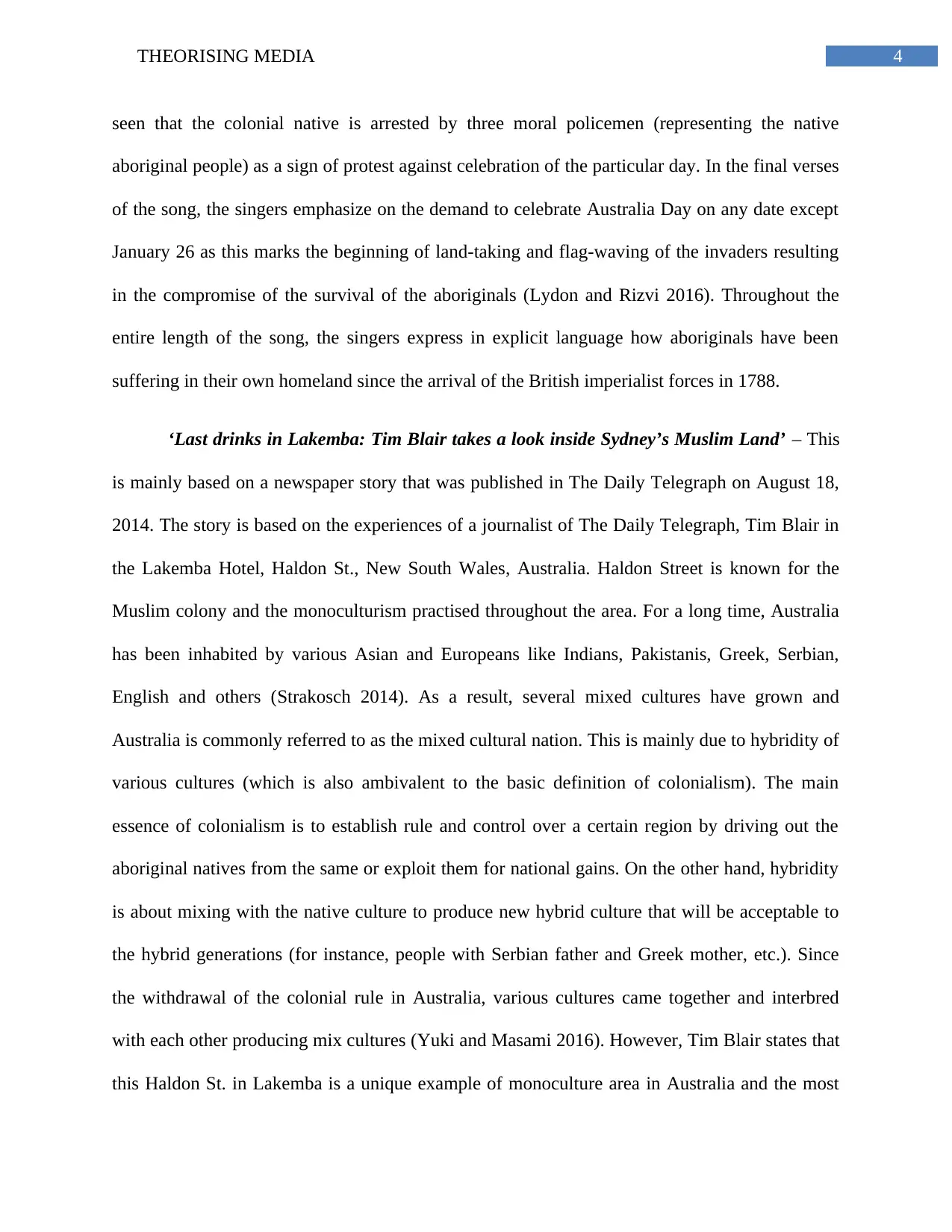
4THEORISING MEDIA
seen that the colonial native is arrested by three moral policemen (representing the native
aboriginal people) as a sign of protest against celebration of the particular day. In the final verses
of the song, the singers emphasize on the demand to celebrate Australia Day on any date except
January 26 as this marks the beginning of land-taking and flag-waving of the invaders resulting
in the compromise of the survival of the aboriginals (Lydon and Rizvi 2016). Throughout the
entire length of the song, the singers express in explicit language how aboriginals have been
suffering in their own homeland since the arrival of the British imperialist forces in 1788.
‘Last drinks in Lakemba: Tim Blair takes a look inside Sydney’s Muslim Land’ – This
is mainly based on a newspaper story that was published in The Daily Telegraph on August 18,
2014. The story is based on the experiences of a journalist of The Daily Telegraph, Tim Blair in
the Lakemba Hotel, Haldon St., New South Wales, Australia. Haldon Street is known for the
Muslim colony and the monoculturism practised throughout the area. For a long time, Australia
has been inhabited by various Asian and Europeans like Indians, Pakistanis, Greek, Serbian,
English and others (Strakosch 2014). As a result, several mixed cultures have grown and
Australia is commonly referred to as the mixed cultural nation. This is mainly due to hybridity of
various cultures (which is also ambivalent to the basic definition of colonialism). The main
essence of colonialism is to establish rule and control over a certain region by driving out the
aboriginal natives from the same or exploit them for national gains. On the other hand, hybridity
is about mixing with the native culture to produce new hybrid culture that will be acceptable to
the hybrid generations (for instance, people with Serbian father and Greek mother, etc.). Since
the withdrawal of the colonial rule in Australia, various cultures came together and interbred
with each other producing mix cultures (Yuki and Masami 2016). However, Tim Blair states that
this Haldon St. in Lakemba is a unique example of monoculture area in Australia and the most
seen that the colonial native is arrested by three moral policemen (representing the native
aboriginal people) as a sign of protest against celebration of the particular day. In the final verses
of the song, the singers emphasize on the demand to celebrate Australia Day on any date except
January 26 as this marks the beginning of land-taking and flag-waving of the invaders resulting
in the compromise of the survival of the aboriginals (Lydon and Rizvi 2016). Throughout the
entire length of the song, the singers express in explicit language how aboriginals have been
suffering in their own homeland since the arrival of the British imperialist forces in 1788.
‘Last drinks in Lakemba: Tim Blair takes a look inside Sydney’s Muslim Land’ – This
is mainly based on a newspaper story that was published in The Daily Telegraph on August 18,
2014. The story is based on the experiences of a journalist of The Daily Telegraph, Tim Blair in
the Lakemba Hotel, Haldon St., New South Wales, Australia. Haldon Street is known for the
Muslim colony and the monoculturism practised throughout the area. For a long time, Australia
has been inhabited by various Asian and Europeans like Indians, Pakistanis, Greek, Serbian,
English and others (Strakosch 2014). As a result, several mixed cultures have grown and
Australia is commonly referred to as the mixed cultural nation. This is mainly due to hybridity of
various cultures (which is also ambivalent to the basic definition of colonialism). The main
essence of colonialism is to establish rule and control over a certain region by driving out the
aboriginal natives from the same or exploit them for national gains. On the other hand, hybridity
is about mixing with the native culture to produce new hybrid culture that will be acceptable to
the hybrid generations (for instance, people with Serbian father and Greek mother, etc.). Since
the withdrawal of the colonial rule in Australia, various cultures came together and interbred
with each other producing mix cultures (Yuki and Masami 2016). However, Tim Blair states that
this Haldon St. in Lakemba is a unique example of monoculture area in Australia and the most
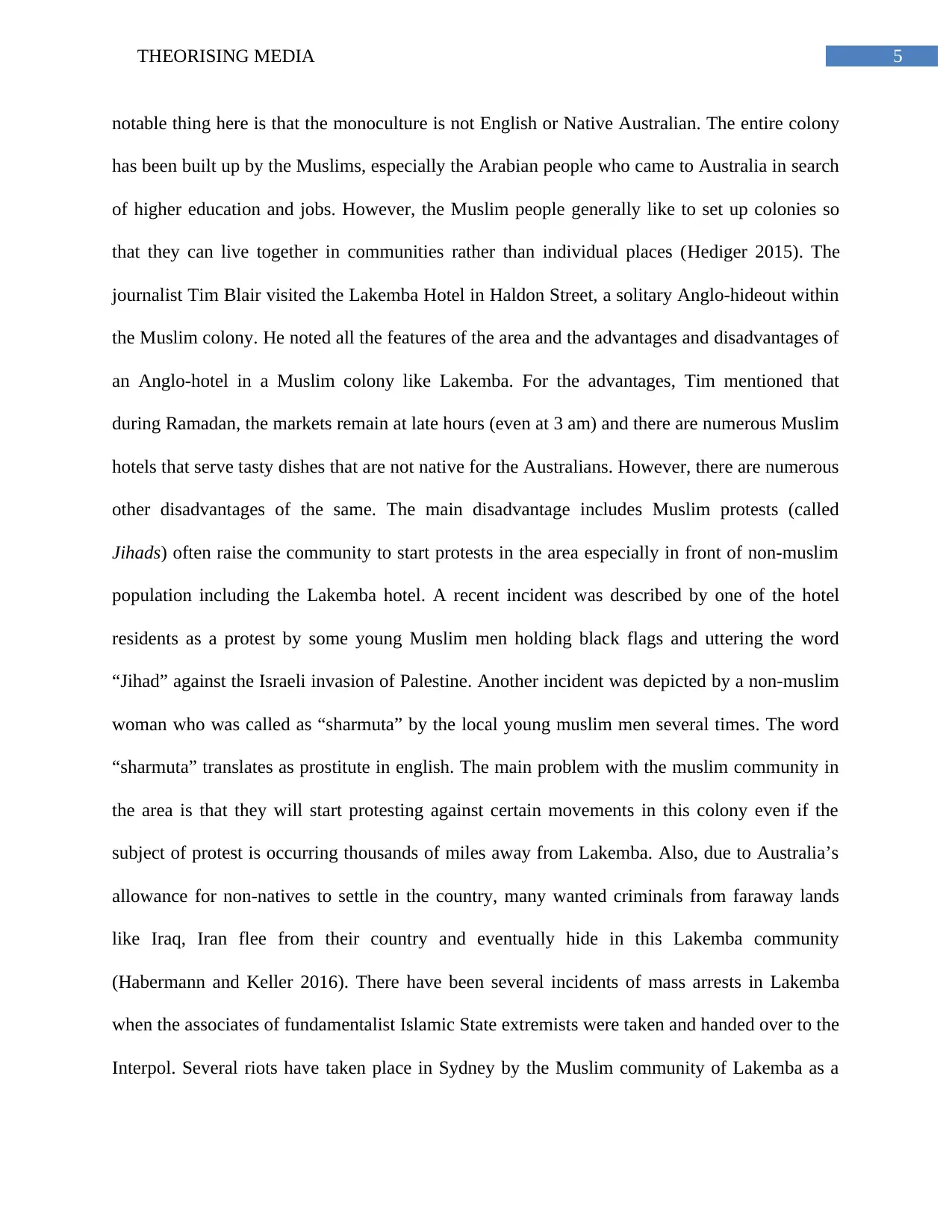
5THEORISING MEDIA
notable thing here is that the monoculture is not English or Native Australian. The entire colony
has been built up by the Muslims, especially the Arabian people who came to Australia in search
of higher education and jobs. However, the Muslim people generally like to set up colonies so
that they can live together in communities rather than individual places (Hediger 2015). The
journalist Tim Blair visited the Lakemba Hotel in Haldon Street, a solitary Anglo-hideout within
the Muslim colony. He noted all the features of the area and the advantages and disadvantages of
an Anglo-hotel in a Muslim colony like Lakemba. For the advantages, Tim mentioned that
during Ramadan, the markets remain at late hours (even at 3 am) and there are numerous Muslim
hotels that serve tasty dishes that are not native for the Australians. However, there are numerous
other disadvantages of the same. The main disadvantage includes Muslim protests (called
Jihads) often raise the community to start protests in the area especially in front of non-muslim
population including the Lakemba hotel. A recent incident was described by one of the hotel
residents as a protest by some young Muslim men holding black flags and uttering the word
“Jihad” against the Israeli invasion of Palestine. Another incident was depicted by a non-muslim
woman who was called as “sharmuta” by the local young muslim men several times. The word
“sharmuta” translates as prostitute in english. The main problem with the muslim community in
the area is that they will start protesting against certain movements in this colony even if the
subject of protest is occurring thousands of miles away from Lakemba. Also, due to Australia’s
allowance for non-natives to settle in the country, many wanted criminals from faraway lands
like Iraq, Iran flee from their country and eventually hide in this Lakemba community
(Habermann and Keller 2016). There have been several incidents of mass arrests in Lakemba
when the associates of fundamentalist Islamic State extremists were taken and handed over to the
Interpol. Several riots have taken place in Sydney by the Muslim community of Lakemba as a
notable thing here is that the monoculture is not English or Native Australian. The entire colony
has been built up by the Muslims, especially the Arabian people who came to Australia in search
of higher education and jobs. However, the Muslim people generally like to set up colonies so
that they can live together in communities rather than individual places (Hediger 2015). The
journalist Tim Blair visited the Lakemba Hotel in Haldon Street, a solitary Anglo-hideout within
the Muslim colony. He noted all the features of the area and the advantages and disadvantages of
an Anglo-hotel in a Muslim colony like Lakemba. For the advantages, Tim mentioned that
during Ramadan, the markets remain at late hours (even at 3 am) and there are numerous Muslim
hotels that serve tasty dishes that are not native for the Australians. However, there are numerous
other disadvantages of the same. The main disadvantage includes Muslim protests (called
Jihads) often raise the community to start protests in the area especially in front of non-muslim
population including the Lakemba hotel. A recent incident was described by one of the hotel
residents as a protest by some young Muslim men holding black flags and uttering the word
“Jihad” against the Israeli invasion of Palestine. Another incident was depicted by a non-muslim
woman who was called as “sharmuta” by the local young muslim men several times. The word
“sharmuta” translates as prostitute in english. The main problem with the muslim community in
the area is that they will start protesting against certain movements in this colony even if the
subject of protest is occurring thousands of miles away from Lakemba. Also, due to Australia’s
allowance for non-natives to settle in the country, many wanted criminals from faraway lands
like Iraq, Iran flee from their country and eventually hide in this Lakemba community
(Habermann and Keller 2016). There have been several incidents of mass arrests in Lakemba
when the associates of fundamentalist Islamic State extremists were taken and handed over to the
Interpol. Several riots have taken place in Sydney by the Muslim community of Lakemba as a
⊘ This is a preview!⊘
Do you want full access?
Subscribe today to unlock all pages.

Trusted by 1+ million students worldwide
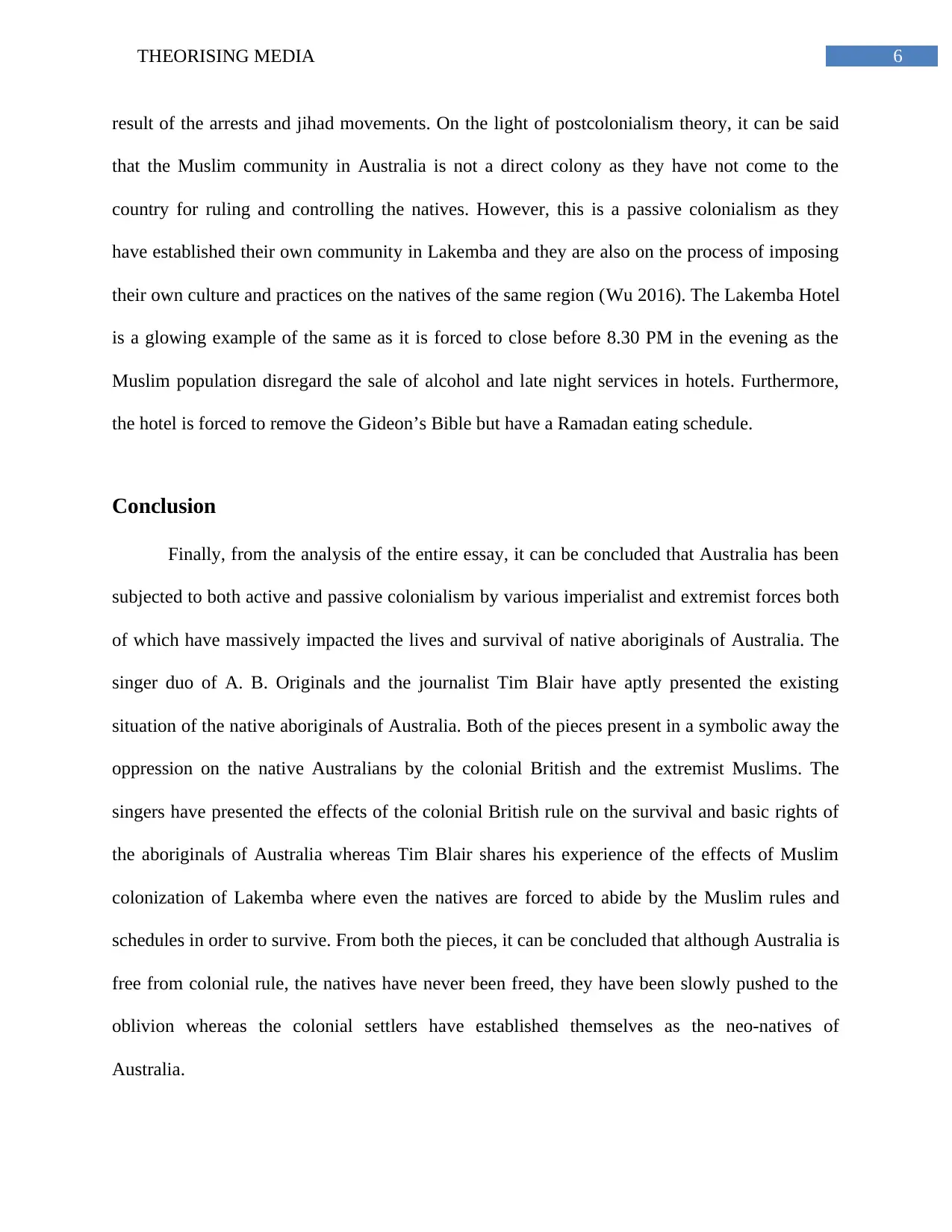
6THEORISING MEDIA
result of the arrests and jihad movements. On the light of postcolonialism theory, it can be said
that the Muslim community in Australia is not a direct colony as they have not come to the
country for ruling and controlling the natives. However, this is a passive colonialism as they
have established their own community in Lakemba and they are also on the process of imposing
their own culture and practices on the natives of the same region (Wu 2016). The Lakemba Hotel
is a glowing example of the same as it is forced to close before 8.30 PM in the evening as the
Muslim population disregard the sale of alcohol and late night services in hotels. Furthermore,
the hotel is forced to remove the Gideon’s Bible but have a Ramadan eating schedule.
Conclusion
Finally, from the analysis of the entire essay, it can be concluded that Australia has been
subjected to both active and passive colonialism by various imperialist and extremist forces both
of which have massively impacted the lives and survival of native aboriginals of Australia. The
singer duo of A. B. Originals and the journalist Tim Blair have aptly presented the existing
situation of the native aboriginals of Australia. Both of the pieces present in a symbolic away the
oppression on the native Australians by the colonial British and the extremist Muslims. The
singers have presented the effects of the colonial British rule on the survival and basic rights of
the aboriginals of Australia whereas Tim Blair shares his experience of the effects of Muslim
colonization of Lakemba where even the natives are forced to abide by the Muslim rules and
schedules in order to survive. From both the pieces, it can be concluded that although Australia is
free from colonial rule, the natives have never been freed, they have been slowly pushed to the
oblivion whereas the colonial settlers have established themselves as the neo-natives of
Australia.
result of the arrests and jihad movements. On the light of postcolonialism theory, it can be said
that the Muslim community in Australia is not a direct colony as they have not come to the
country for ruling and controlling the natives. However, this is a passive colonialism as they
have established their own community in Lakemba and they are also on the process of imposing
their own culture and practices on the natives of the same region (Wu 2016). The Lakemba Hotel
is a glowing example of the same as it is forced to close before 8.30 PM in the evening as the
Muslim population disregard the sale of alcohol and late night services in hotels. Furthermore,
the hotel is forced to remove the Gideon’s Bible but have a Ramadan eating schedule.
Conclusion
Finally, from the analysis of the entire essay, it can be concluded that Australia has been
subjected to both active and passive colonialism by various imperialist and extremist forces both
of which have massively impacted the lives and survival of native aboriginals of Australia. The
singer duo of A. B. Originals and the journalist Tim Blair have aptly presented the existing
situation of the native aboriginals of Australia. Both of the pieces present in a symbolic away the
oppression on the native Australians by the colonial British and the extremist Muslims. The
singers have presented the effects of the colonial British rule on the survival and basic rights of
the aboriginals of Australia whereas Tim Blair shares his experience of the effects of Muslim
colonization of Lakemba where even the natives are forced to abide by the Muslim rules and
schedules in order to survive. From both the pieces, it can be concluded that although Australia is
free from colonial rule, the natives have never been freed, they have been slowly pushed to the
oblivion whereas the colonial settlers have established themselves as the neo-natives of
Australia.
Paraphrase This Document
Need a fresh take? Get an instant paraphrase of this document with our AI Paraphraser
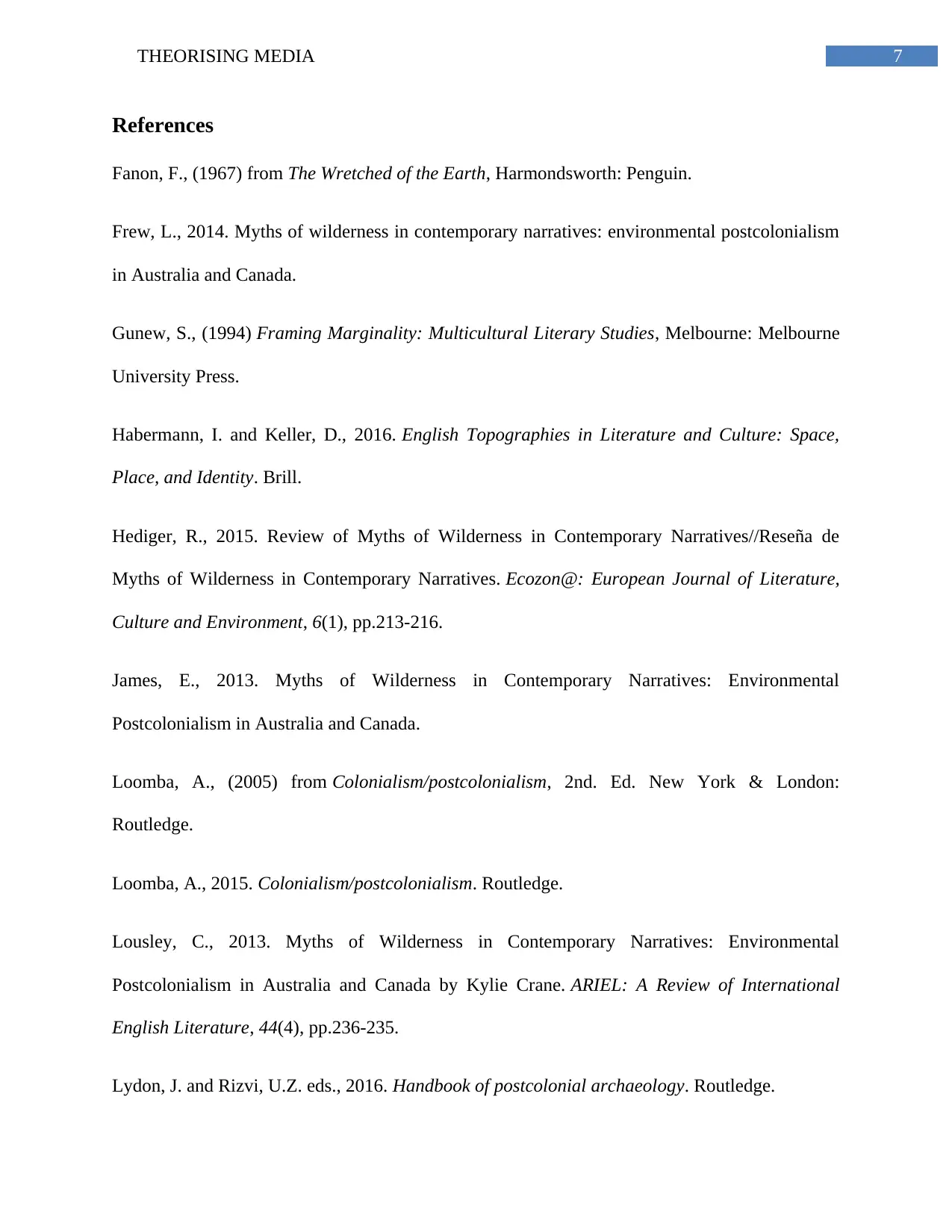
7THEORISING MEDIA
References
Fanon, F., (1967) from The Wretched of the Earth, Harmondsworth: Penguin.
Frew, L., 2014. Myths of wilderness in contemporary narratives: environmental postcolonialism
in Australia and Canada.
Gunew, S., (1994) Framing Marginality: Multicultural Literary Studies, Melbourne: Melbourne
University Press.
Habermann, I. and Keller, D., 2016. English Topographies in Literature and Culture: Space,
Place, and Identity. Brill.
Hediger, R., 2015. Review of Myths of Wilderness in Contemporary Narratives//Reseña de
Myths of Wilderness in Contemporary Narratives. Ecozon@: European Journal of Literature,
Culture and Environment, 6(1), pp.213-216.
James, E., 2013. Myths of Wilderness in Contemporary Narratives: Environmental
Postcolonialism in Australia and Canada.
Loomba, A., (2005) from Colonialism/postcolonialism, 2nd. Ed. New York & London:
Routledge.
Loomba, A., 2015. Colonialism/postcolonialism. Routledge.
Lousley, C., 2013. Myths of Wilderness in Contemporary Narratives: Environmental
Postcolonialism in Australia and Canada by Kylie Crane. ARIEL: A Review of International
English Literature, 44(4), pp.236-235.
Lydon, J. and Rizvi, U.Z. eds., 2016. Handbook of postcolonial archaeology. Routledge.
References
Fanon, F., (1967) from The Wretched of the Earth, Harmondsworth: Penguin.
Frew, L., 2014. Myths of wilderness in contemporary narratives: environmental postcolonialism
in Australia and Canada.
Gunew, S., (1994) Framing Marginality: Multicultural Literary Studies, Melbourne: Melbourne
University Press.
Habermann, I. and Keller, D., 2016. English Topographies in Literature and Culture: Space,
Place, and Identity. Brill.
Hediger, R., 2015. Review of Myths of Wilderness in Contemporary Narratives//Reseña de
Myths of Wilderness in Contemporary Narratives. Ecozon@: European Journal of Literature,
Culture and Environment, 6(1), pp.213-216.
James, E., 2013. Myths of Wilderness in Contemporary Narratives: Environmental
Postcolonialism in Australia and Canada.
Loomba, A., (2005) from Colonialism/postcolonialism, 2nd. Ed. New York & London:
Routledge.
Loomba, A., 2015. Colonialism/postcolonialism. Routledge.
Lousley, C., 2013. Myths of Wilderness in Contemporary Narratives: Environmental
Postcolonialism in Australia and Canada by Kylie Crane. ARIEL: A Review of International
English Literature, 44(4), pp.236-235.
Lydon, J. and Rizvi, U.Z. eds., 2016. Handbook of postcolonial archaeology. Routledge.
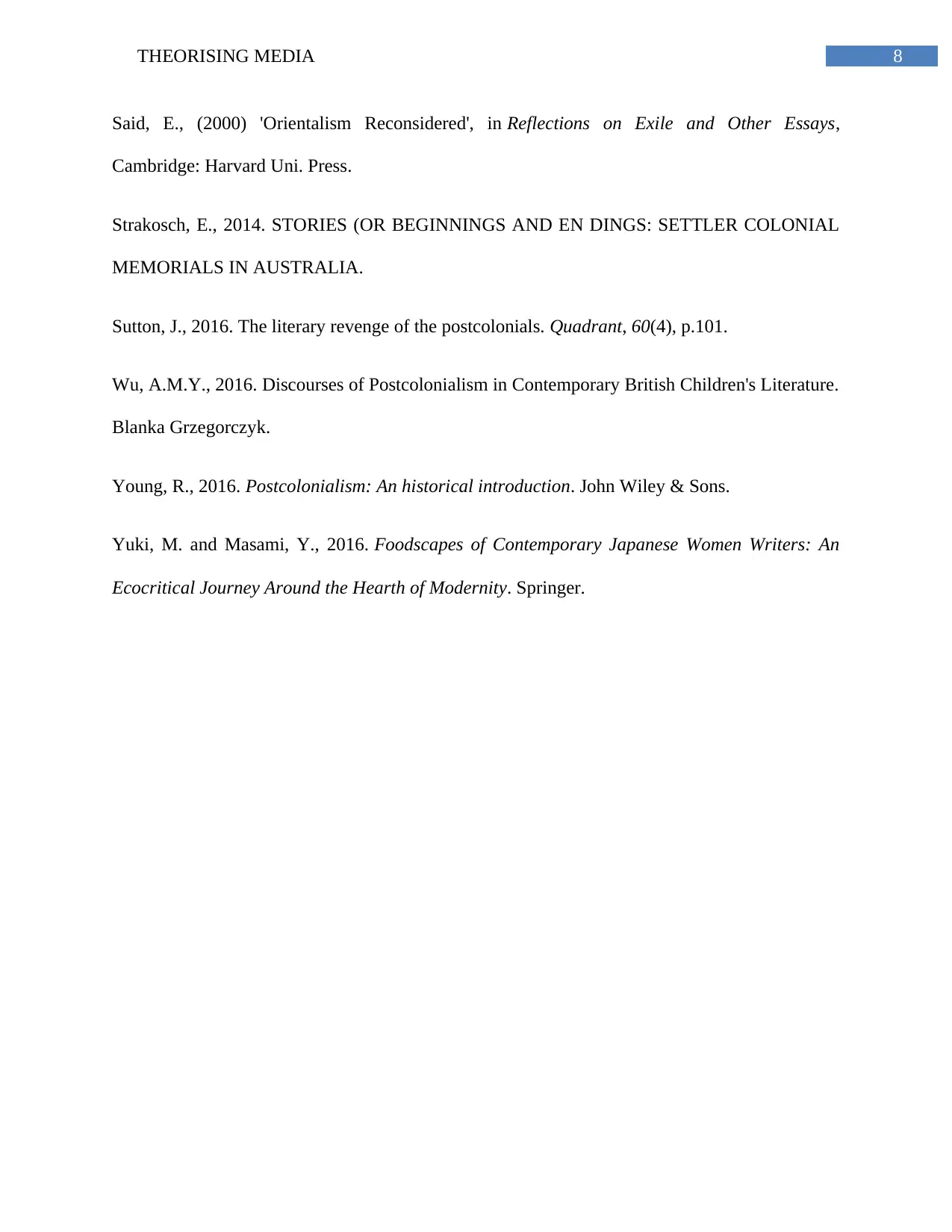
8THEORISING MEDIA
Said, E., (2000) 'Orientalism Reconsidered', in Reflections on Exile and Other Essays,
Cambridge: Harvard Uni. Press.
Strakosch, E., 2014. STORIES (OR BEGINNINGS AND EN DINGS: SETTLER COLONIAL
MEMORIALS IN AUSTRALIA.
Sutton, J., 2016. The literary revenge of the postcolonials. Quadrant, 60(4), p.101.
Wu, A.M.Y., 2016. Discourses of Postcolonialism in Contemporary British Children's Literature.
Blanka Grzegorczyk.
Young, R., 2016. Postcolonialism: An historical introduction. John Wiley & Sons.
Yuki, M. and Masami, Y., 2016. Foodscapes of Contemporary Japanese Women Writers: An
Ecocritical Journey Around the Hearth of Modernity. Springer.
Said, E., (2000) 'Orientalism Reconsidered', in Reflections on Exile and Other Essays,
Cambridge: Harvard Uni. Press.
Strakosch, E., 2014. STORIES (OR BEGINNINGS AND EN DINGS: SETTLER COLONIAL
MEMORIALS IN AUSTRALIA.
Sutton, J., 2016. The literary revenge of the postcolonials. Quadrant, 60(4), p.101.
Wu, A.M.Y., 2016. Discourses of Postcolonialism in Contemporary British Children's Literature.
Blanka Grzegorczyk.
Young, R., 2016. Postcolonialism: An historical introduction. John Wiley & Sons.
Yuki, M. and Masami, Y., 2016. Foodscapes of Contemporary Japanese Women Writers: An
Ecocritical Journey Around the Hearth of Modernity. Springer.
⊘ This is a preview!⊘
Do you want full access?
Subscribe today to unlock all pages.

Trusted by 1+ million students worldwide
1 out of 9
Your All-in-One AI-Powered Toolkit for Academic Success.
+13062052269
info@desklib.com
Available 24*7 on WhatsApp / Email
![[object Object]](/_next/static/media/star-bottom.7253800d.svg)
Unlock your academic potential
Copyright © 2020–2026 A2Z Services. All Rights Reserved. Developed and managed by ZUCOL.